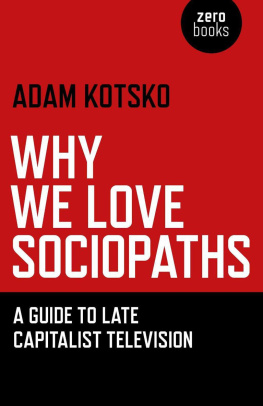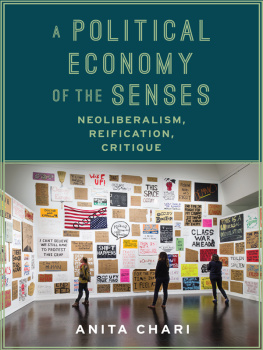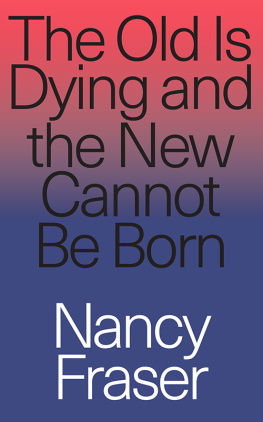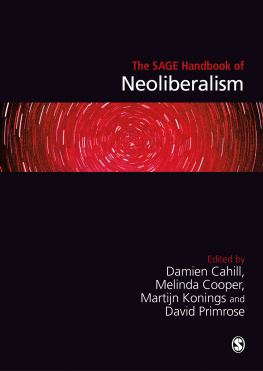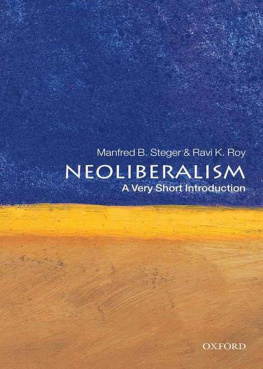NEOLIBERALISMS DEMONS
On the Political Theology of Late Capital
ADAM KOTSKO
Stanford University Press
Stanford, California
Stanford University Press
Stanford, California
2018 by the Board of Trustees of the Leland Stanford Junior University. All rights reserved.
No part of this book may be reproduced or transmitted in any form or by any means, electronic or mechanical, including photocopying and recording, or in any information storage or retrieval system without the prior written permission of Stanford University Press.
Printed in the United States of America on acid-free, archival-quality paper
Library of Congress Cataloging-in-Publication Data
Names: Kotsko, Adam, author.
Title: Neoliberalisms demons : on the political theology of late capital / Adam Kotsko.
Description: Stanford, California : Stanford University Press, 2018. | Includes bibliographical references and index.
Identifiers: LCCN 2018003014 (print) | LCCN 2018007386 (ebook) | ISBN 9781503607132 (ebook) | ISBN 9781503604810 (cloth : alk. paper) | ISBN 9781503607125 (pbk. : alk. paper)
Subjects: LCSH: Political theology. | NeoliberalismPhilosophy. | EconomicsPhilosophy.
Classification: LCC BT83.59 (ebook) | LCC BT83.59 .K68 2018 (print) | DDC 320.51/3dc23
LC record available at https://lccn.loc.gov/2018003014
Cover design: Rob Ehle
Cover illustration: composite from iStock imagery by Rob Ehle
CONTENTS
ACKNOWLEDGMENTS
This study extends some of the arguments presented in my previous book, The Prince of This World, and to that extent could be understood as a sequel or follow-up. At the same time, it does not presuppose any knowledge of its predecessora fact that I verified empirically by presenting the basic argument put forward here in a series of lectures prior to the publication of that work. I would like to thank the following people for the generous speaking invitations that made it possible for me to develop these ideas: Joel Crombez (University of Tennessee at Knoxville), Monique Rooney (Australian National University), Julian Murphet (University of New South Wales), Robyn Horner and David Newheiser (Australian Catholic University), Bryan Cook and Catherine Ryan (Melbourne School of Continental Philosophy), Mike Grimshaw and Cindy Zeiher (Canterbury University), Campbell Jones (Auckland University), Harold Stone (Shimer College), Jared Rodrguez and Matthew Smith (Northwestern University), and Colby Dickinson (Loyola University Chicago). In addition to my hosts, many other interlocutors have pushed my thinking on this project. Among those not already named, I would like to highlight the contributions of Virgil Brower, Peter Hallward, Ted Jennings, Anna Kornbluh, James Martel, Knox Peden, and especially Marika Rose, who generously read and provided detailed comments on the entire manuscript. I am grateful, as well, to Emily-Jane Cohen of Stanford University Press for her support of this project. Finally, I must express my gratitude to Natalie Scoles, not only for her support and companionship, but for the prescient suggestion that I should teach my first elective course on the devilsetting in train the intellectual journey that has led to this book. In this, as in so many other cases, she knew me better than I knew myself.
INTRODUCTION
Every academic critique of neoliberalism is an unacknowledged memoir. We academics occupy a crucial node in the neoliberal system. Our institutions are foundational to neoliberalisms claim to be a meritocracy, insofar as we are tasked with discerning and certifying the merit that leads to the most powerful and desirable jobs. Yet at the same time, colleges and universities have suffered the fate of all public goods under the neoliberal order. We must therefore do more with less, cutting costs while meeting ever-greater demands. The academic workforce faces increasing precarity and shrinking wages even as it is called on to teach and assess more students than ever before in human historyand to demonstrate that we are doing so better than ever, via newly devised regimes of outcome-based assessment. In short, we academics live out the contradictions of neoliberalism every day.
The present investigation is also autobiographical in a more specific sense. It represents an attempt to think the three great catastrophes that have shaped my political awarenessthe Iraq War, the Global Financial Crisis, and the installation of Trump as US presidenttogether, as part of a single overarching phenomenon. As I discuss in my countably persisted despite being foreign to neoliberal logic. For reasons that will become clear as my argument unfolds, I view such interpretations as inadequate and unsatisfying. Accordingly, I have sought to develop a more holistic account of the neoliberal era that renders apparent right-wing deviations legible as an integral feature rather than an inexplicable holdover from a previous era.
Yet this study is not itself a mere reaction to recent political events. It builds on concepts and themes from my previous book, The Prince of This World. There, I undertook a genealogy of the figure of the devil with an eye toward uncovering his legacy in the modern world. I argued that the devil has to be understood as at once a theological and a political figure, who plays an ever-changing but consistently decisive role in the strategies that key Christian theologians have deployed to legitimate the Christian social order in their respective eras. By the late medieval period, the devil had become a necessary scapegoat who allowed God to avoid direct responsibility for evil while also giving God the opportunity to enhance his glory by overcoming evil with good.
Crucial to this strategy was the notion that the devil freely chose to rebel against God. This claim served as the foundation of a moral paradigm in which freedom, far from being the basis of creaturely dignity or fellowship with God, is thought exclusively as a mechanism for generating blameworthiness. I designated this form of moral entrapment as demonization, in recognition of the fact that it is the means by which God generates demons within the theological system itself. And I argued that modernity inherited this demonizing notion of freedom as blameworthiness and laid it at the foundation of its own strategies of self-legitimation.
Given my focus on the origin and history of the figure of the devil in pre-modern thought, my claims about modernity operated at a very high level of generality. This book represents an effort to provide a more detailed warrant for my account of the devils legacy through a concentrated study of one particular paradigm of modern secular governance, namely neoliberalism, which I put forward as the paradigm in which the strategy of moral entrapment that I call demonization has been pushed to its uttermost limits. Neoliberalism makes demons of us all, confronting us with forced choices that serve to redirect the blame for social problems onto the ostensible poor decision making of individuals. This strategy attempts to delegitimate protestand ultimately even political debate as suchin advance by claiming that the current state of things is what we have all collectively chosen.
At the time that I began developing the core argument of this book in the middle of 2016, the neoliberal consensus seemed nearly unassailable. In the United States the arch-neoliberal Hillary Clinton was in the process of consolidating her victory over the social democrat Bernie Sanders, and Donald Trump, though already coasting toward the Republican nomination, still seemed to be a bizarre sideshow rather than a serious political force. Like everyone elseapparently including even Trump himselfI was shocked at the election result. As I tried to come to terms with the increasingly surreal political events that began to unfold in the wake of that awful day, the concepts I had been developing for this project proved helpful. At the same time, the changed political circumstances shed fresh light on the neoliberal order. Given my poor track record as a prognosticator, I do not pretend to predict how the so-called Age of Trump will play out, or indeed whether Trump will even still be president by the time this book is published. Yet I maintain that the very fact such a thing was possible reveals something important about neoliberalism, something that will continue to be true even if things ultimately go back to normal (i.e., the neoliberal status quo ante is restored) in the coming years.
Next page

